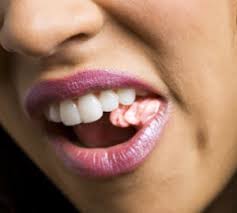5 surprising health benefits of chewing gum
- Posted on
- Comment
 If you have a habit of popping achewing gum in your mouth after a meal or when you’re bored, then you’ll be glad to know that surprising health benefits of chewing gum are now being discovered. Read on to learn why chewing gum might actually be good for you.
If you have a habit of popping achewing gum in your mouth after a meal or when you’re bored, then you’ll be glad to know that surprising health benefits of chewing gum are now being discovered. Read on to learn why chewing gum might actually be good for you.
1. Boosts Mental Power
Chewing gum boosts brain activity in several ways. For instance, psychologists have discovered that chewing gum can help you enhance your memory. An experiment was conducted where two groups of people took the same examination. One group was given gum to chew while the other was not. Results showed that the gum-chewing group got higher test scores. This boost in memory might be linked to the chewing motion of the jaw. When you chew gum, your hippocampus becomes stimulated. The hippocampus is the part of the brain which plays a major role in memory. Aside from boosting your memory, chewing gum also encourages more blood flow to the brain. When you chew gum, your heart rate increases and more oxygen is delivered to your brain area.
2. Reduces Stress and Tension
Chewing gum can help you fight stress and anxiety. Research has shown that students who chew gum during exams tend to be more alert and focused. This is because gum helps you cope with the stress that is often associated with tests. Stress is not the only negative emotion that chewing gum can help you through. Whenever you feel irritated or frustrated, you might find that chewing gum can help you relax.
3. Contributes to Weight Loss
If you’re currently trying to lose weight, chewing gum can also prove to be beneficial for you. The next time you crave a snack or a second helping of dessert, pop a stick of gum into your mouth instead. Since gum contains very few calories per serving, it makes an ideal snack that will not ruin your diet. The act of chewing and the flavor of the gum will help you fight your cravings for other snacks that are high in calories and fats.
4. Improves Oral Health
You were probably told when you were little that sweets and candy can rot your teeth. However, chewing gum might just do the opposite. If you tend to suffer from oral health problems like bad breath or gum infection, you might want to chew some gum to relieve these symptoms. When you chew gum, your saliva production is also stimulated. If you didn’t know already, saliva is the most important factor when it comes to maintaining good oral health. Saliva has antibacterial properties and can help flush out food debris, remaining sugars and other harmful acids in your mouth. Sugarfree gum has also been found to be effective in protecting the enamel of your teeth. In fact, chewing on some sugar-free gum after meals can lessen your tooth cavities.
5. Improves Digestion
You might not be aware of it but chewing gum can also improve your digestion, as long as you chew your gum after meals. Notice how you frequently swallow while chewing your gum, because of excess saliva production? This helps keep digestive acids down in your stomach.
-3fatchicks








 (Selorm) |
(Selorm) |  (Nana Kwesi)
(Nana Kwesi)